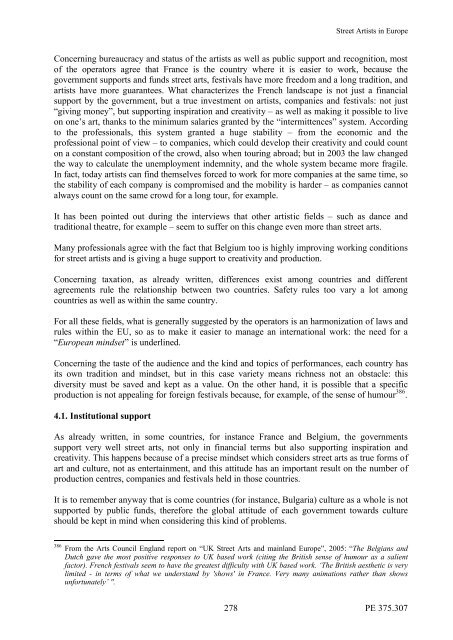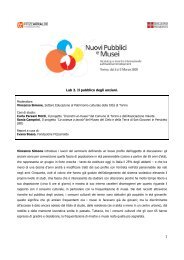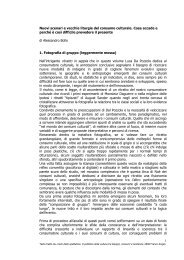STREET ARTISTS IN EUROPE - Fondazione Fitzcarraldo
STREET ARTISTS IN EUROPE - Fondazione Fitzcarraldo
STREET ARTISTS IN EUROPE - Fondazione Fitzcarraldo
You also want an ePaper? Increase the reach of your titles
YUMPU automatically turns print PDFs into web optimized ePapers that Google loves.
Street Artists in Europe<br />
Concerning bureaucracy and status of the artists as well as public support and recognition, most<br />
of the operators agree that France is the country where it is easier to work, because the<br />
government supports and funds street arts, festivals have more freedom and a long tradition, and<br />
artists have more guarantees. What characterizes the French landscape is not just a financial<br />
support by the government, but a true investment on artists, companies and festivals: not just<br />
“giving money”, but supporting inspiration and creativity – as well as making it possible to live<br />
on one’s art, thanks to the minimum salaries granted by the “intermittences” system. According<br />
to the professionals, this system granted a huge stability – from the economic and the<br />
professional point of view – to companies, which could develop their creativity and could count<br />
on a constant composition of the crowd, also when touring abroad; but in 2003 the law changed<br />
the way to calculate the unemployment indemnity, and the whole system became more fragile.<br />
In fact, today artists can find themselves forced to work for more companies at the same time, so<br />
the stability of each company is compromised and the mobility is harder – as companies cannot<br />
always count on the same crowd for a long tour, for example.<br />
It has been pointed out during the interviews that other artistic fields – such as dance and<br />
traditional theatre, for example – seem to suffer on this change even more than street arts.<br />
Many professionals agree with the fact that Belgium too is highly improving working conditions<br />
for street artists and is giving a huge support to creativity and production.<br />
Concerning taxation, as already written, differences exist among countries and different<br />
agreements rule the relationship between two countries. Safety rules too vary a lot among<br />
countries as well as within the same country.<br />
For all these fields, what is generally suggested by the operators is an harmonization of laws and<br />
rules within the EU, so as to make it easier to manage an international work: the need for a<br />
“European mindset” is underlined.<br />
Concerning the taste of the audience and the kind and topics of performances, each country has<br />
its own tradition and mindset, but in this case variety means richness not an obstacle: this<br />
diversity must be saved and kept as a value. On the other hand, it is possible that a specific<br />
production is not appealing for foreign festivals because, for example, of the sense of humour 386 .<br />
4.1. Institutional support<br />
As already written, in some countries, for instance France and Belgium, the governments<br />
support very well street arts, not only in financial terms but also supporting inspiration and<br />
creativity. This happens because of a precise mindset which considers street arts as true forms of<br />
art and culture, not as entertainment, and this attitude has an important result on the number of<br />
production centres, companies and festivals held in those countries.<br />
It is to remember anyway that is come countries (for instance, Bulgaria) culture as a whole is not<br />
supported by public funds, therefore the global attitude of each government towards culture<br />
should be kept in mind when considering this kind of problems.<br />
386 From the Arts Council England report on “UK Street Arts and mainland Europe”, 2005: “The Belgians and<br />
Dutch gave the most positive responses to UK based work (citing the British sense of humour as a salient<br />
factor). French festivals seem to have the greatest difficulty with UK based work. ‘The British aesthetic is very<br />
limited - in terms of what we understand by 'shows' in France. Very many animations rather than shows<br />
unfortunately’ ".<br />
278<br />
PE 375.307






